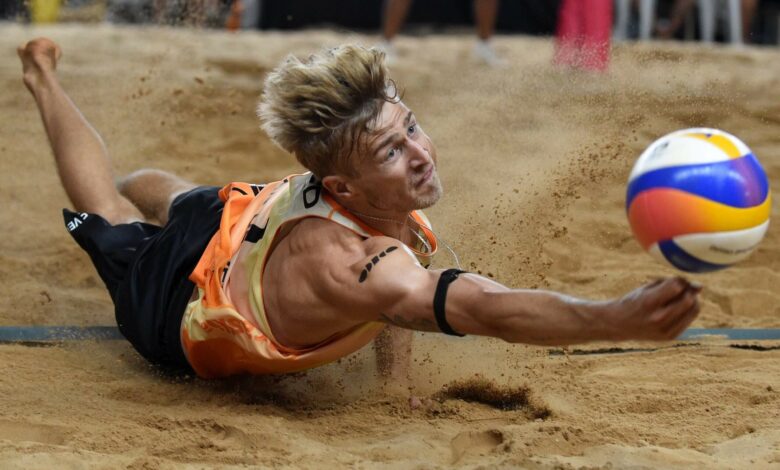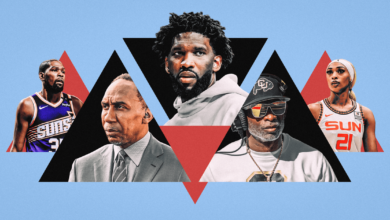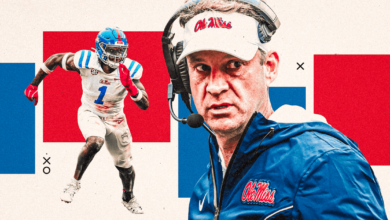He raped a 12 year old ten years ago. Now he’s at the Olympics

Steven van de Velde will step onto a picturesque sand track near the foot of the Eiffel Tower on Sunday to fulfil his long-cherished dream of becoming an Olympic athlete.
In order for him to represent the Netherlands at the Paris Games, the Dutch Olympic Committee agreed that he would stay outside the athletes’ village and not speak to the media, who would undoubtedly ask him questions about his prison sentence for raping a 12-year-old girl when he was 19.
The 29-year-old Van de Velde has been active in the volleyball tour and at international competitions for years. However, his selection for the Dutch Olympic team has led to much criticism and new attention for his difficult past.
The Dutch Olympic Committee and the Dutch Volleyball Association refused to make Van de Velde available and to comment. The Athletics outside of a statement that said in part that Van de Velde had been included in the team “after careful consideration” and that he had “consistently” met their high standards. Van de Velde, who was approached by a Daily Mail reporter upon his arrival in Paris this week, declined to comment on the federation’s and the committee’s statements.
Van de Velde was sentenced to four years in prison in 2016 after admitting taking a cheap flight from Amsterdam to a small airport north of London in 2014 and having sex with a 12-year-old girl after they had been talking regularly online for months.
He was caught after advising his victim to take a morning-after pill. Staff at a family planning clinic alerted the girl’s family and the police because of her age.

(Pablo Morano/BSR Agency/Getty Images)
Van de Velde spent 13 months in prison, 12 of which were in Britain, before being transferred to the Netherlands under a treaty between the countries. He was resentenced to a shorter sentence under Dutch law and was released in early 2017.
After he got out of prison, he gave an interview to the Algemeen Dagblad in which he said: “I have been branded as a sex monster, as a pedophile. I am not that — really not.”
Van de Velde’s name remains on the UK’s sex offenders register. Aylesbury Crown Court heard how he began talking to the girl on social media – on Skype, Facebook and Snapchat – and spoke to her almost every day for a few months.
Their communication started when she sent him a friend request. He first thought she was 16, but even when she told him her real age, he didn’t break off contact.
On 2 August 2014, he boarded a plane to meet his victim in person. From Luton Airport, he took a taxi 22 miles to Milton Keynes, the town where she lived, for their sexual encounters, which included vaginal sex during which she complained that he hurt her. They also drank Baileys Irish Cream Liqueur together and slept on a cardboard box under a hotel staircase when they were unable to get a room.
Before returning to the Netherlands, Van de Velde advised his victim to take the morning-after pill, because she was not using contraception.
Back in his home country, Van de Velde’s sporting career began to flourish.
He had just won a national championship in 2015 and seemed poised to make the Dutch team for the following summer’s Olympic Games in Rio de Janeiro. Then a European arrest warrant was issued for him on charges of child sex.
On 8 January 2016, he was extradited to the United Kingdom, where he pleaded guilty to three charges of rape of a child.
In court, his lawyer Linda Strudwick argued that Van de Velde was not a “predatory young man” and that flying to the UK to meet the girl had been an “impulsive decision”. She claimed that his actions did not amount to grooming and that he had not made the trip “with the aim of having sex”.
She said: “There was mutual support as two frightened youngsters. He has lost a great sporting career and he is being branded a rapist. In the Netherlands the term means violent sexual assault without consent. The headlines all say it: ‘a sex monster.’ It is clearly the end of his career.”
When Van de Velde was sentenced, it was revealed in court that the victim had been tormented by guilt and self-harm following his arrest. Judge Francis Sheridan told Van de Velde: “The emotional damage that has been done to this child is enormous. As she grows older, she will have to realise that you are not the nice person she thought you were and hoped you would be.”
Under British law, victims of sexual offences are entitled to lifelong anonymity, both during the legal proceedings and afterwards.

These Olympic Games will be the highlight of Van de Velde’s career (Buda Mendes/Getty Images)
In the Netherlands, the sentence was reduced because the legislation on sex with minors is less strict there than in England.
In a TV interview a year after his release, Van de Velde attributed his crime to the fact that he was a teenager and “still figuring things out”.
“I made that choice in my life when I wasn’t ready for it,” he told NOS. “I was a little lost and now I have so much more life experience.”
He added: “Everybody wants to be liked, everybody wants to be respected, and with something like that on your resume, it’s hard. I can’t take it back, so I have to take the consequences. It’s the biggest mistake of my life.”
Since then, he has rebuilt his life and sports career. He has been playing for his country on the international stage since 2017 and in 2022 he married Kim van de Velde, a German beach volleyball player who is also trained as a police officer. They have a two-year-old son.
Van de Velde will compete in the Paris Olympics, as a career highlight, with his playing partner Matthew Immers, 23. The duo hopes to build on their recent success, when they finished second in a tournament on the beach volleyball world tour in May. Van de Velde also took part in several world and European championships.
On Sunday morning they will play their first group match in Paris against an Italian duo.
“I know the Steven of today and I am happy about that,” Immers said. “I feel comfortable with him, we take good care of each other. I am 23, he is 29. He is a kind of second father to me, who supports me.”
In a statement, the Dutch Olympic Committee said Van de Velde deserved a second chance because he had shown that he had “grown and changed his life positively”.
The statement reads: “We are very aware that the renewed publicity about Steven van de Velde is causing a lot of emotion, which we fully understand, as the events at the time were very serious. Much has happened since then. Steven has served his sentence and has completed an extensive rehabilitation programme with specialist professionals, including the probation service. Experts have concluded that there is no risk of recidivism.”
“He has shown himself to be an exemplary professional and human being and there has been no reason to doubt him since his return,” said Michel Everaert, general manager of the Dutch Volleyball Association.
The volleyball association added that “when Van de Velde now looks in the mirror, he sees a mature and happy man, married and father of a beautiful son.”
According to Pieter van den Hoogenband, chef de mission of the Dutch Olympic Committee, the measures to change his accommodation and keep him out of the media were necessary because the attention for Van de Velde had increased around the Games in Paris.
“He’s not going to downplay it. We have to respect that and help him as a team member to be able to perform,” said Van den Hoogenband.
The IOC has no rules of its own for selecting individual participants for the Games. The decisions are left to the national Olympic committees themselves.
“They (the Dutch Olympic Committee) have issued a statement in which they have made it very clear that many protective measures are being taken, special additional protective measures,” IOC spokesman Mark Adams told a news conference in Paris on Saturday.
Some national Olympic officials have made it clear that they would not have selected an athlete to play under similar circumstances.
“If an athlete or staff member held those beliefs, they should not be part of our team,” said Australia’s chef de mission Anna Meares.
Van de Velde’s appearance at the Games has angered campaign groups who said he had shown a “chilling” lack of remorse and empathy for his victim. A petition with almost 81,000 signatures called on the IOC to ban known sex offenders from competing.
The Survivors Trust, a UK-based group that supports victims of sexual violence, said in a statement that his participation was “further confirmation of the shocking tolerance we have for child sexual abuse.” It added: “The rape of a child was planned, calculated with international travel, and will undoubtedly cause lifelong trauma for its victim, irreversibly changing the course of her life. As a society, we must embrace a zero-tolerance approach to this horrific and costly crime.”
“An athlete convicted of child sexual abuse, regardless of country, should not be allowed to compete in the Olympic Games,” added Julie Ann Rivers-Cochran, executive director of The Army of Survivors. “Despite Van de Velde’s justifications, there is no excuse for raping a child. Van de Velde’s statement reveals a lack of remorse and understanding of the consequences of his actions. Raping a minor is not a ‘misdemeanor’ — it is a criminal offense that should disqualify people from competing in the Olympic Games.”
When Van de Velde was sentenced in 2016, Judge Sheridan told him: “Your hopes of representing your country now lie like a shattered dream. Your actions over those two days in England have destroyed your life and you could have been a leader in your sport had you never come to England and committed these offences.”
Yet, eight years later, Van de Velde’s dreams have not yet been shattered.
(Top photo: Lucio Tavora/Xinhua via Getty Images)




